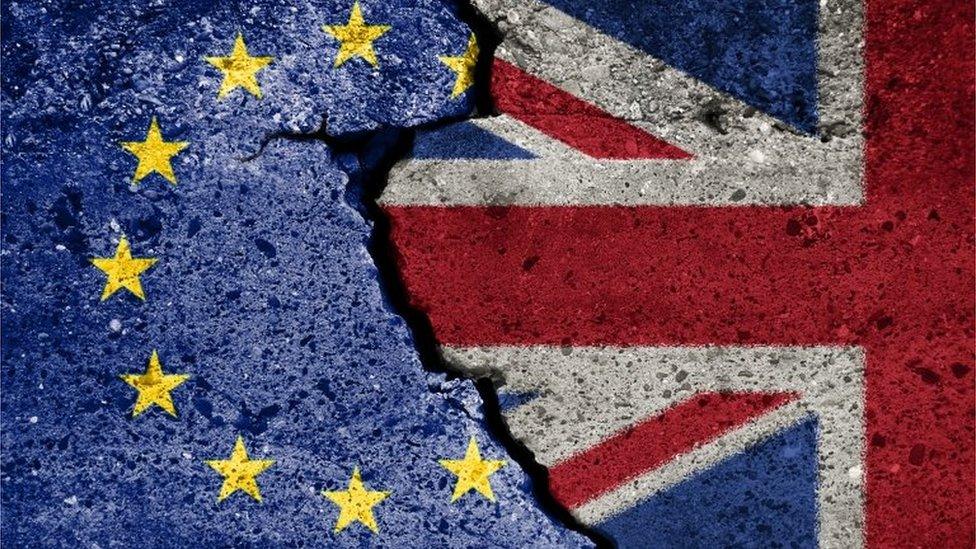Brexit: PM says 'sweet reason' can get UK and EU to trade deal
- Published
- comments
Boris Johnson: Brexit situation "very tricky"
Boris Johnson has said he hopes the "power of sweet reason" will allow the UK and EU to reach a post-Brexit trade deal this week.
The prime minister is to meet European Commission President Ursula von der Leyen in Brussels in the coming days, as a deadline for agreement nears.
He told the BBC the situation was "very tricky" but "hope springs eternal".
The two sides still disagree on fishing rights, business competition rules and how any deal would be enforced.
They are racing to strike an agreement before the UK is due to stop following EU trading rules when the Brexit transition period finishes on 31 December.
On Tuesday, EU sources told the BBC the EU's chief negotiator Michel Barnier told the bloc's Europe ministers trade talks were now tilting towards no deal being reached before the deadline.
If an agreement is not reached and ratified by 31 December, the UK and EU could introduce import charges on each other's goods.
Separately, the UK and EU have reached agreement on how rules in the Brexit withdrawal agreement will be implemented, particularly in relation to Northern Ireland, following lengthy discussions in recent months.
Mr Johnson and Ms von der Leyen will hold a face-to-face meeting, after a 40-minute phone call on Monday failed to produce a breakthrough on the two sides' future relationship.
They promised to discuss "remaining differences", which the UK and EU negotiating teams - led by Lord Frost and Michel Barnier - have not been able to bridge despite a week of intense talks.
Confused by Brexit jargon? Reality Check unpacks the basics.
The leaders of the 27 EU member states will also discuss future UK-EU trade at a Brussels summit on Thursday.
Speaking to the BBC, Mr Johnson said: "I'm always hopeful, but I've got to be honest with you, the situation at the moment is very tricky."
But he added that "hope springs eternal" and said: "You've got to be optimistic. You've got to believe there's the power of sweet reason."
Mr Johnson also warned: "We will see where we get to in the course of the next two days, but I think the UK government's position is that we are willing to engage at any level, political or otherwise, we are willing to try anything.
"But there are just limits beyond which no sensible, independent government or country could go and people have got to understand that."
He later told his cabinet that an agreement "must maintain the core principles of sovereignty and control" and the UK would thrive whatever the outcome.

Brexit - The basics
Brexit happened but rules didn't change at once: The UK left the European Union on 31 January but leaders needed time to negotiate a deal for life afterwards - they got 11 months
Talks are happening: The UK and the EU have until 31 December to agree a trade deal as well as other things, such as fishing rights
If there is no deal: Border checks and taxes will be introduced for goods travelling between the UK and the EU. But deal or no deal, we will still see changes

Mr Barnier and Lord Frost met earlier on Tuesday in Brussels to draw up a list of outstanding differences. The UK negotiator will return to London to update the prime minister.
After briefing ambassadors from the EU's 27 member states, Mr Barnier tweeted, external: "Full unity. We will never sacrifice our future for the present. Access to our market comes with conditions."
Michael Roth, Germany's Europe minister, said the outcome of the leaders' meeting was "totally uncertain" given there had been "no substantial progress" in recent weeks and "fundamental disagreements" remained.
The EU has suggested negotiations could continue after 1 January if no deal was agreed by then but Downing Street insisted the process had to finish this month.
Labour welcomed the decision to keep talking, but said the PM should have become involved at an earlier stage.
What are they arguing about?
The UK and EU are at loggerheads over the so-called "level playing field" - a set of shared rules and standards to ensure businesses in one country do not have an unfair advantage over their competitors in others.
Brussels wants the UK to follow EU rules closely in areas such as workers' rights and environmental regulations, but the UK says the goal of Brexit is to break free from following common rules and reassert national sovereignty.
And the two sides disagree on how any future trading disputes should be resolved.
On fishing, the EU is warning that, without ongoing access to UK waters for its fleets, UK fishermen will no longer have special access to EU markets to sell their goods.
But the UK argues that what goes on in its own waters should be under its control as a sovereign country.
One trade agreement is reached
The UK has signed an interim agreement with Norway and Iceland to support trade in goods and minimise costs to businesses and consumers from the start of 2021.
The government said the "continuity" deal meant UK exporters and importers would operate on the same terms as now, with no taxes or duties on 95% of Norwegian goods and 90% of Icelandic goods - including fish fillets.
It is hoped the deal, which also includes safeguards on the flow of personal data and recognition of professional qualifications, will help pave the way for a full trade agreement next year.
Trade between the UK and the two Nordic countries, which are both members of the European Economic Area, is worth more than £27bn.


- Published7 December 2020
